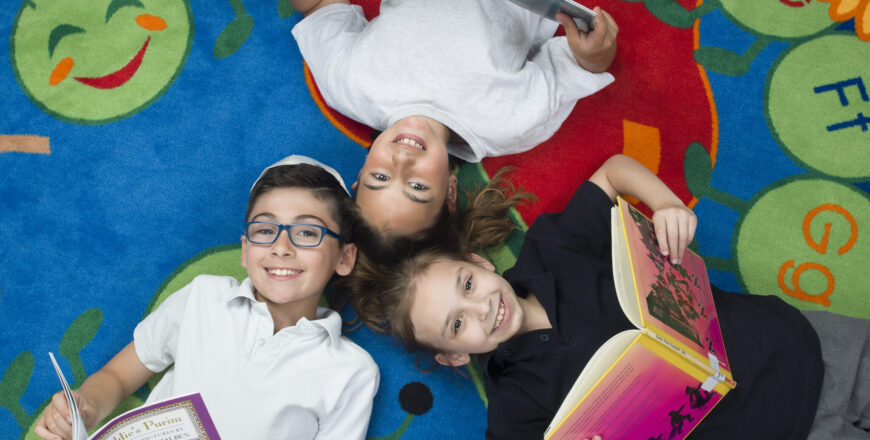
Q&A with Federation CJA
Since 2017, Federation CJA in Montreal, Canada, has engaged Rosov Consulting in a number of major projects to learn about the community and support some of its major initiatives. To share the nature of this work with others, we recently sat down for a Q&A with Natana Shek, Chief Jewish Identity and Engagement Officer, and Pamela Teitelbaum, Chief Strategy and Impact Officer. We hope you enjoy their insights and learnings.
Q: What are your roles and responsibilities at Federation CJA?
A: Natana is the Chief Jewish Identity and Engagement Officer, which is one of the pillars of Federation. Under the pillar sits everything from PJ Library to teen engagement to young adult engagement; immersive experiences like Birthright Israel, March of the Living, Journey of Hope; Hillel and campus and advocacy efforts; and 13 Jewish day school systems. She also manages a large funders collaborative called Passport to Jewish Life.
Pamela is the Chief Strategy and Impact Officer, and she oversees community strategy building, the granting programs, the development of a leadership development institute, and the impact measurement processes and systems supporting partners both inside and outside Federation.
Q: When and why did Federation CJA first engage Rosov Consulting?
A: We first engaged Rosov back in 2017. It was when the Passport to Jewish Life Funders Collaborative went for a second round of funding and wanted to develop and augment the strategies from when we started. In the collaborative, we had five different major family foundations who came together, all of which had agreed on common outcomes, but the way to get to those outcomes were dramatically different. We worked with Wendy and her team in terms of developing a theory of impact for the stakeholder group and subsequently developing KPIs and an evaluation framework, as well as a governance structure for the group.
Q: Are there certain key learnings from Rosov’s work that have informed Federation CJA’s efforts?
A: The community needs assessment that Rosov conducted in 2019–2020 was an exceptionally helpful report for better understanding the community, its needs, how it was viewing Jewish community and cultural engagement, and the central priorities to focus on. The study provided useful background information for making decisions about the kind of focus that our work needed to take with respect to programming.
Additionally, when we were doing the community needs assessment, at the same time we engaged Rosov to look at interfaith inclusion in the Montreal community. Instead of doing a separate survey, we decided to piggyback on the community survey and ask more questions about, and do a deeper dive into, the interfaith or multifaith communities and what their needs were. We garnered a lot of very useful information and data from that process. Subsequently, we built out a program area on interfaith inclusion, hired a professional, and have what is now a rich beginning for strategically developing an inclusive community.
Q: What stands out to you as common threads or defining principles in our work together?
A: The work has always been extremely professional. Rosov knows how to hold the client accountable for achieving what needs to be achieved, and the deliverables are always very well presented and contain important takeaways to work with afterwards. The theory of impact that we built together for Passport has put in place the building blocks to be able to develop some rich and robust initiatives and strategies to help affect the outcomes we wanted to achieve.
Wendy and Frayda have brought such incredible expertise in terms of process building and thought partnership. They have helped us think through how to do our leadership development work in the best way possible, how to support the team in working with our stakeholders, what are the critical moments/points in our work that are challenging, and how to build a quality process. They have also supported us and our stakeholders in moderating and facilitating discussions that allow us to further define and move our plans and strategies forward.
They have great experience, including wonderful skills in facilitation and communication, as well as measurement and evaluation. They have such great insight, and it’s great to have thought partners in that way. Personality wise, we love the people we’re working with at Rosov, so that’s always a bonus. Their efficiency, professionalism, patience, and level of insight and wisdom around the work is extremely important to achieving success.
Q: Is there anything else about the work, the process, or the learnings that you think would be helpful for others to hear when thinking about these types of engagements themselves?
A: There’s something to be said about not underestimating the value-add that consultants can bring to the table when it comes to building out process, working with stakeholders, and making space for difficult conversations with the community. It can only improve and enrich the work that we do. We sometimes think it’s just going to be easier to give it to somebody else to do this kind of thing. But often it’s more than that. It’s about communication and having those difficult conversations that you can’t necessarily have without that outside voice.
When you have a rich foundation, it’s easy to build things on it. And when you don’t, it’s very difficult. All the work that we did with Rosov and continue to do is focused on building those foundations so that you have the infrastructure, the support to be able to build out and develop other initiatives or strategies or impacts on that—and evaluate them, measure them, and then try to revise them and improve them.




